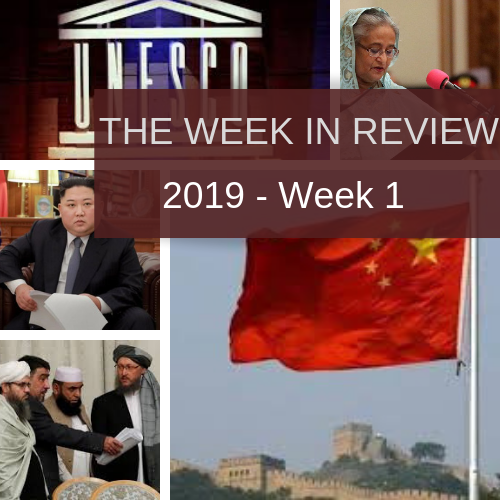
Bangladesh held its 11th parliamentary elections on December 30, in which Prime Minister Hasina secured her third consecutive victory winning almost all 300 of the parliamentary seats contested. Amidst vote rigging allegations across the country, the opposition alliance that won seven seats, condemned the vote as "farcical", marred by violence, intimidation and vote rigging claims.
Sheikh Hasina's Awami League has run Bangladesh since 2009 and won 288 seats in this election. However, the leading opposition party, the Bangladesh National Party (BNP) accused the Awami League of using stuffed ballots.
The elections were also marred by violent clashes between the ruling party and the opposition in which 17 people were killed. Opposition candidates encountered violence, threats and harassment when they attempted to campaign.
Kim Jong-un warned in his New Year Speech that North Korea would find a "new path" towards peace and denuclearisation should the United States fail to carry out its end of the agreement. The normally isolated North Korea experienced a rapid diplomatic rapprochement in 2018, which resulted in an agreement signed between Kim and the US President Donald Trump to work towards the "denuclearisation of the Korean peninsula" in Singapore last June.
However, follow-up negotiations have stalled due to a disagreement between the sides on what this Singapore pact actually means. Including the request from Washington, that North Korea declare its nuclear and missile facilities. North Korea claims to have been in support of the pact by closing its nuclear weapons test site, beginning to dismantle its Sohae long-range missile engine test stand and launch platform. It has shown a willingness to take down facilities in Yongbyon should the US take corresponding steps, but it has accused the US of being "gangster-like" in its sanctions approach.
Washington, meanwhile, has said it will maintain sanctions until the "final, fully verified denuclearisation" of the North. In Tuesday's speech, however, Kim said he was willing to meet Trump again "at any time", reflecting the US president's comments that he too wants a second summit with the North's leader this year.
The United States and Israel have officially quit UNESCO, a result of a process triggered in 2017 over concerns that the organisation had an anti-Israel bias. The withdrawal served a blow to the organisation, which the S helped found after the Second World War to promote peace.
The US has demanded "fundamental reform" in the agency, denouncing it for criticising Israel's occupation of East Jerusalem, naming Jewish sites as Palestinian heritage sites and granting full membership to Palestine in 2011. The US had previously pulled out of UNESCO in 1984 when the Reagan administration said that it viewed the agency as mismanaged, corrupt and used to advance Soviet interests.
The US stopped funding UNESCO after it voted to include Palestine as a member state in 2011, severely affecting the organisation's ability to function, forcing it to cut programmes and freeze hiring. The US stopped funding UNESCO after it voted to include Palestine as a member state in 2011, but its State Department has maintained a UNESCO office and sought to weigh in on policy behind the scenes.
Iran conformed that a delegation of the Afghan Taliban visited Tehran to discuss effort to bring a negotiated end to Afghanistan's 17-year war.
Iran's Supreme National Security Council stated that these were not the first talks between Iran and the Taliban and would not be the last, with Ali Shamkhani of the SNSC confirming Iran's commitment to facilitating dialogue between the insurgents and the Afghan government. These talks continue as Afghanistan suffers near daily attacks from the Taliban.
The Taliban have recently held talks with representatives of several regional countries with the US planning on withdrawing up to half the 14,000 American troops from Afghanistan. The Taliban have previously held talks with the US, the UAE as well as Saudi, Pakistani and Emirati representatives.
China is said to have tested its most powerful non-nuclear weapon. The bomb, which is 16-20 ft long is supposed to be a rival to America's most powerful conventional bomb, but weighs less than the US version. Its strength is supposedly only second to that of a nuclear weapon.
China's arms industry giant NORINCO has showcased a new type of massive aerial bomb with massive destructive potential, according to local media outlets. This is the first time the new bomb has been revealed to the public.
The weapon is similar to the "fuel-air explosive", a class of weapon that spreads and ignites a cloud of flammable gas. Such bombs can be either thermobaric or fuel-air explosives, a NORINCO representative has claimed that its bomb is not thermobaric, suggesting it is a fuel-air explosive.